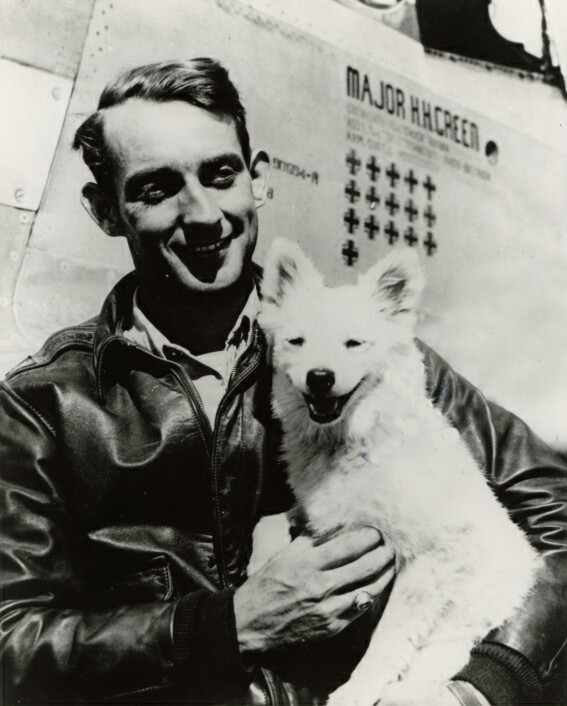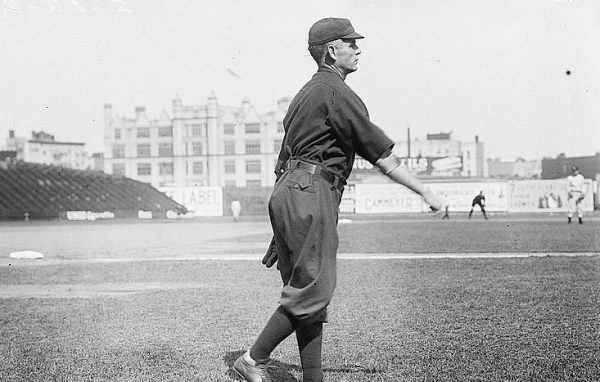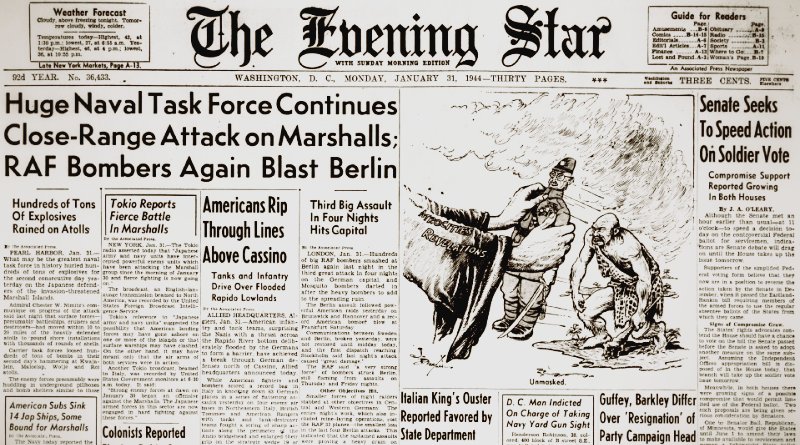World War II Chronicle: January 31, 1944
Click here for TODAY’S NEWSPAPER
Capt. Herschel H. “Herky” Green of the 317th Fighter Squadron is now an ace, having bagged six enemy warplanes in one sortie yesterday. Green already had three victories to his credit prior to this mission, and may have added more if he hadn’t used up all his ammunition… Also on the front page: Washington, D.C. residents say they have spotted the United States’ new jet-powered airplane. The Pentagon isn’t commenting…

George Fielding Eliot column on page six… Sports on page 11. Grantland Rice brings up a memory of Washington Senators owner Clark Griffith back when he pitched and managed for the New York Highlanders 40 years ago, well before baseball’s most-famous franchise became the Yankees in 1912. The Highlanders played at Hilltop Park, which sat just a few blocks away from the Polo Grounds. In 1903, Griffith’s first season as New York’s skipper, he won 14 games on the mound and he managed the Highlanders to a 72-62 record, 14 games behind the Boston Americans (renamed the Red Sox in 1908). Thanks to Cy Young’s pitching Boston went on to win the first modern World Series that year. Nap Lajoie was the top American League hitter in 1903; Ty Cobb wouldn’t make his professional debut for two more seasons and Babe Ruth was just eight years old. Lajoie he was so dominant that the Cleveland Blues renamed their club in his honor — the Napoleons, later shortened to the Naps.

1903 seems like ancient history to us, but here is someone sharing personal experiences about players born not long after the Civil War, and who played in the 1890s. Incidentally, Griffith’s nephew Sherry Robertson played for the Senators last year and accidentally killed a fan by throwing a ball over the head of his first baseman, which sailed into the stands. Although the man said he felt fine, the team doctor told him to go to the hospital, where he died the next day from a fractured skull. Robertson is now playing ball for the Navy…
Page 19 reports that Army Air Force fliers have destroyed between 500 and 700 Japanese planes this month, the highest tally of the war so far.
Roving Reporter by Ernie Pyle
IN ITALY — One evening Sergt. James E. Knight, a flight chief from McAleater, Okla., took me in tow and we spent the evening gabbing about 50 of the mechanics at this dive-bomber airdrome.
The men at this base live in the same big apartment building as the officers. Their quarters are exactly the same, except that the men have their places fixed up more comfortably and keep them neater than the officers.
You’ll find that true in almost any Air Force group in the combat area because the men, being craftsmen, can make things that the average officer doesn’t know how to make. They fix up stoves and lights and shelves, and make little gadgets that give a homey touch to their quarters.
Sergt. Charlie Bennett, a youngster on the maintenance crew from York, S.C., has made a beautiful ashtray from the base of a German 880millimeter shell, with American machine-gun bullets sticking out of it. It’s too heavy to lug around for a year or more of the war, so Charlie thinks he’ll send it home.
One of Charlie’s roommates is Sergt. Mintford Blair of Spokane, Wash., a crew chief in the dive-bomber squadron. In the same group is Blair’s uncle, Sergt. Ted Chapman, an electrical specialist. Uncle and nephew are about the same age. They enlisted together two years ago, and have been lucky enough to stay together ever since.
Sergeant Knight, being a flight chief, has charge of about six planes. Another flight chief is Sergt. Orville Reeves of Fittstown, Okla. Sergt. Reeves is one of the few people I’ve run into in the Air Force who have superstitions. Superstitiousness is rare even among the pilots. The last war’s phobia against three-on-a-match1Three on a match is when troops are afraid to light three mens’ cigarettes from the same match, as it is bad luck and one of the three will be killed. is almost unheard of now.
Sergeant Reeves normally has six planes in his charge, but sometimes he will have more. His idiosyncrasy is that he won’t accept seven. He doesn’t mind the work, and he’ll accept two extra planes, but not one.
The reason is that three different times since they’ve come overseas he has had an extra plane shoved onto him — making a total of seven — and every time his flight has lost a plane the following day. So he’ll have none of it any more, and you can’t blame him.
Sergeant Knight carries a whole walletful of pictures of his wife and year-old baby. He saw his son only once, when he was a week old. Knight says he’s now “sweating out” a picture of his youngster in the Italian colonel’s suit he sent him fro Christmas. Most of the boys have sent home shawls or cameos or lace or something.
Sergt. Knight is one of the many mechanics who feel they are not personally doing enough to help win the war. For instance, Knight says all the men under him are now so well trained that he has almost nothing to do, and that he could go back and take flight training and would hardly be missed around here.
You’d think that after seeing what the combat pilots go through the mechanics would be content to stay on the ground. Yet when applications for flight training were reopened 10 per cent of the squadron applied.
Always in the combat area you’ll hear soldiers on ground jobs talking earnestly along this line: why couldn’t well-trained 4-Fs do their jobs and release them for combat? They know that a guy doesn’t have to be a Samson to stand ordinary Army life, and they point out cases such as that of the soldier who was discharged from the Army on physical grounds yet was capable of playing swell football when he got back in civil life.
Constantly, also, the Air Force boys pay tribute to the infantry. In two weeks around the airfield I think I heard the subject brought up two hundred times. Pilots and mechanics both feel the same way — their hats are off to the infantry.
One pilot said to me: “What must you think of us anyhow, knowing as you do what the infantry goes through and then finding that all we talk about is when we can get our missions in and go home?”
I told him I thought they were acting like very normal human beings, and that, furthermore, hard as infantry life is, I believed the average infantryman looked on the combat pilots as too dangerous to be envied.
Evening star. (Washington, D.C.), 31 January 1944. Chronicling America: Historic American Newspapers. Lib. of Congress.
https://chroniclingamerica.loc.gov/lccn/sn83045462/1944-01-31/ed-1/
